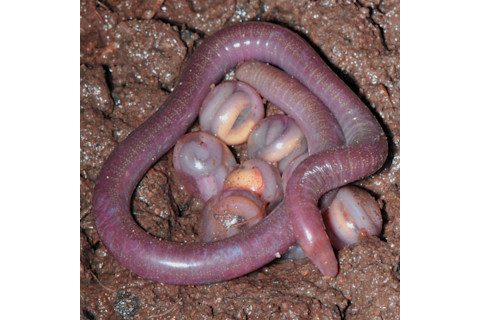
A caecilian from the newly discovered family, coiled over her eggs.
After thousands of hours of digging in the north Indian jungle, scientists have discovered a new family of amphibians. But they don't look much like frogs: they resemble nothing so much as big, fat nightcrawlers.
There are about 180 species worldwide of legless amphibians, called caecilians (pronounced just like "Sicilian"), which can grow to be up to three feet long and live only in wet, tropical regions. This newly defined Indian family, which falls within that group, includes several species new to science. Caecilians have unusual nesting habits: the females lay eggs deep in the soil and stay coiled around them, apparently without eating, for the 2-3 months it takes for them to hatch. One of the most striking videos we have of the new creatures is of young almost ready to be born squirming and writhing within the clear globes of their eggs, like eyeballs filled with living jelly (watch below).
Appearances aside, ceacilians are not related to earthworms at all. This is a case of convergent evolution, in which two unrelated groups of animals evolve similar traits in response to their environments. Like worms, ceacilians burrow in wet soil, and for that lifestyle, leglessness is de rigeur.
The Indian family's nearest relatives are actually more than 7,000 miles away, in Africa. But they didn't get there by inchworming their way over; instead, the species' shared ancestors probably evolved when the two landmasses were connected. Images courtesy of SD Biju













